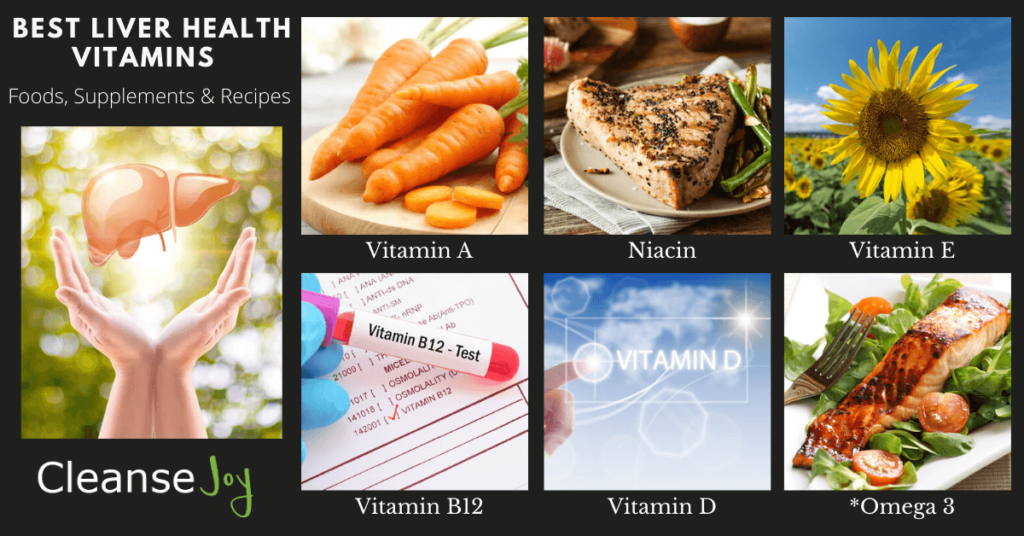 |
Heidi Moretti, MS, RD Functional Medicine Nutritionist Detoxification Expert |
Vitamin A | Vitamin B12 | Niacin | Vitamin D | Vitamin E | Omega 3 | Recipes
There is a backstory behind my interest in liver health, and more specifically, vitamins for liver health. The numbers of liver disease caused by poor diets are growing by the minute. I see SO many young people with liver disease more than ever before. I believe a lot of these can be avoided with healthy eating.
In this article, I will share with you several key vitamins for liver health, and the best ways to get them from foods, easy to make recipes, and when needed, supplements.
Top Vitamins For Liver Health
Several foods are specifically high in vitamins for liver health, that despite an impressive amount of research, are often missed from our plates. Many people don’t realize that some of these vitamins can go a long way to helping liver function.
Vitamin A & Beta Carotene
I am very excited to start the list of vitamins for liver health with vitamin A. Due to its importance and also since it’s quite easy to get from natural foods.
Both its active (Retinol) and carotene forms are needed, especially since some people can’t effectively convert carotenes into active vitamin A due to genetics. More on that below.
Vitamin A as Retinol
Active vitamin A, or retinol, comes from animal foods like cod liver oil, liver, fish, and meats. Since the liver is the main storage site of vitamin A, one of the best source of vitamin A comes from animal liver.
While eating high quality of animal liver is generally healthy, caution should be taken if you have a history of iron overload or high cholesterol. Always speak with your doctor before starting any new supplements or meal plans.
According to research, vitamin A can effectively reduce fat in the liver and help control inflammation. As in any of the other vitamins for liver health, the benefits don’t stop here. The body needs vitamin A to make hormones and increases immunity signaling that can ramp down inflammation, such as t-regulatory cells.[1,2]
Beta Carotene
β-Carotene is the orange-red pigment you often see in many vegetables and fruits that serve as the precursor for vitamin A. According to research, Beta carotene can protect liver tissues from toxins in the air, such as pollutants and unwanted chemicals.
You should always make sure to get carotene-rich foods on top of retinol, as it has additional functions and benefits.
Carrots, pumpkin, sweet potatoes and winter squash are great ways to get more carotene in your diet.
Other sources of beta carotene include dark leafy greens such as kale, and spinach. You may wonder how come these greens are high in Beta carotene but are not orange or red? Since greens also contain high levels of chlorophyll (the green pigment), the dominant color of the plants ends up as dark green which “covers” the orange or red pigment.
Problems with Retinol Conversion
Due to genetics, some people can’t effectively convert carotenoids into active vitamin A.[3]
I’m actually one of these people. Right away I noticed improvements in my health when I started focusing on getting more retinol from my diet.
On that note, unlike beta-caretone (the body uses what is needed, and get rids of the excess), you have to be careful with retinol supplements, as you can overdo it. It is always best to get it from natural food sources if possible. Make sure to choose cod liver, fish, and meats from clean, preferably wild sources that are low in mercury and heavy metals.
Vitamin B12 Deficiency & Liver Health
Vitamin B12 deficiency is something that I am continually encountering because of today’s food trends, poor gut health, and also medications that rob the body of vitamin B12.
Many people don’t realize that vitamin B12 is actually essential for a healthy liver. The research data suggests a connection between low levels of vitamin B12 and non alcoholic fatty liver.
On top of the importance of vitamin b12 to liver health, the body needs vitamin B12 to make red blood cells, protect nerves, and reduce inflammation; a problem in people who have liver damage. In fact, vitamin B12 can suppress the production of inflammatory compounds generated from our immune system called cytokines.[4]
Vitamin B12 Supplements
The most reliable sources of vitamin B12 are animal meats and fish. For this reason, vegans and vegetarians need to take B12 supplements and monitor their levels. The risks of low vitamin B12 levels, however, are not limited to vegans and vegetarians. So it is best to check your levels, and take supplements if needed.
When it comes to B12 supplements, the absorption of natural “active” forms of vitamin B12 such as Adenosylcobalamin and Methylcobalamin is shown to be much more effective than synthetic ones. In fact, one study found that the combination of these forms was comparable to vitamin B12 injection.[5]
VEGANSAFE B-12 is a good example of a vitamin B12 supplement that uses these two natural active forms of vitamin B12. It is also one of the few vitamin B12 supplements out there that is certified organic.
Niacin (Vitamin B3) & Liver
In addition to vitamin B12, it is important to meet all your B vitamins as they can also support liver health.
Niacin or vitamin B3, shines in this regard due to its ability to reduce cholesterol, triglycerides and fatty blood lipids. Studies found that people who eat more niacin rich foods have less liver fat.[6]
Good food sources of niacin include: animal liver (once again), chicken, turkey, and wild fish like wild salmon, and tuna.[7]
Vegetarian sources include portabella mushrooms, avocados, peanuts, rice and potatoes. If you are vegan or vegetarian, make sure to check the amounts you get from your foods, to make sure you get enough niacin.
Vitamin D3 & Your Liver
Vitamin D3 is actually a hormone your body makes after sun exposure. Several studies have found a link between low levels of vitamin D3 to liver health. The researchers believe that vitamin D3 can help protect the liver from inflammation, insulin resistance and nonalcoholic fatty liver.[8]
Unfortunately, many people have low vitamin D levels due to our modern lifestyle that encourages working indoors, and once out, heavy sunscreen use. This is not just a problem in cold climates, and it is usually among the first vitamins checked in standard blood tests.
While the body primarily make vitamin D3 after sun exposure, you can still get some amounts from fatty fish such as wild salmon, and some types of mushrooms, depending on their growing conditions.
Vitamin D3 supplements are often taken considering how common vitamin D deficiency is. You should work with your doctor to test your levels and determine the vitamin D3 dose you need.
Vitamin E
Do you know that over 90 percent of Americans don’t get enough vitamin E from their diet? For most people, this should be a super simple fix. Just add in some of the following, one or more servings per day: avocados, raw almonds or sunflower seeds, and olive oil. Also try some clean source of almond milk for a vitamin E boost.
The researchers found that Vitamin E helps protect the liver cells due to its strong antioxidant effect. Also here, your body needs vitamin E for many other functions.
Omega 3 Fats & Liver Health
While not vitamins, omega 3 fats are a critical component for liver health, especially in reducing inflammation and fats in the liver.[9]
Wild fish are the most concentrated way to increase omega 3 fats in your diets, especially their long-chain DHA and EPA.
Make sure to choose small wild-caught fish from clean areas, such as wild alaskan salmon, to avoid high mercury content. Farmed fish are usually raised on a diet that is not intended for fish (such as corn), and as such, many health experts do not consider them as a healthy option.
For vegans, good sources of omega 3 include chia seeds, flaxseed and hemp seeds. Plant sources of Omega 3, however, have a low conversion rate to DHA & EPA. So if you follow a vegan or a vegetarian diet, you may want to take omega 3 supplement from algae oil.
Recipes to Support Nutrients & Vitamins for Liver Health
It’s easy to put together meals that support liver detox and maintain a healthy liver. Below are some easy options. A major benefits of eating whole foods, is that they support your entire body.
Try to sit in the sun while enjoying the following recipes to soak up some liver healthy vitamin D.
Liver Health Salad Recipe
Liver Health Salad Recipe
Ingredients
- ½ cup fresh raw carrots, grated (beta carotene)
- 2 cups organic spinach (beta carotene)
- 1 medium avocado, sliced (vitamin E)
- 1 oz raw sunflower seeds (vitamin E)
- 3 oz wild alaskan salmon, grilled, or baked (niacin, vitamin B12, Vitamin D, omega 3 )
- 1 cup broccoli, whole pieces, raw or lightly steamed (vitamin C, antioxidants that support liver health)
- 5 small fresh cherry tomatoes optional
Dressing
- 1-2 tbsp olive oil, extra virgin (vitamin E)
- 2 tbsp lemon juice
- Himalayan salt and pepper to taste
Instructions
- Combine all the ingredients on your plate.
- Add Himalayan salt and pepper to taste.
Vegan Options:
- Instead of the salmon, sprinkle on 2 tbsp of nutritional yeast and 1 ounces hemps seeds (omega 3).
- Make sure to supplement vitamin B12 and vitamin D3
Liver Health Salad Recipe Nutritional Label
Bonus: Liver Health Guacamole
So many dishes are served with processed bread or crackers. There are many healthy alternatives, however, that also include some of the key vitamins for liver health.
Use fresh carrots, celery or sweet potato slices instead of processed crackers using yummy liver friendly appetizers, and a healthy guacamole as a dip.
If you are a Guacamole fan, make sure to try the Detox Healthy Guacamole Recipe.
Read Next
Liver Detox Supplements & Herbs: Learn about unique nutrients and herbs that have powerful natural liver detoxification properties.
- Fasting Mimicking Diet: Expert Review, Common Mistakes & Guidelines - April 14, 2020
- Homemade Energy Drinks: Natural Recipes – Power, Focus & Speed - March 8, 2020
- How to Detox Your Body: 3 Evidence Based Easy Recipes - January 28, 2020
